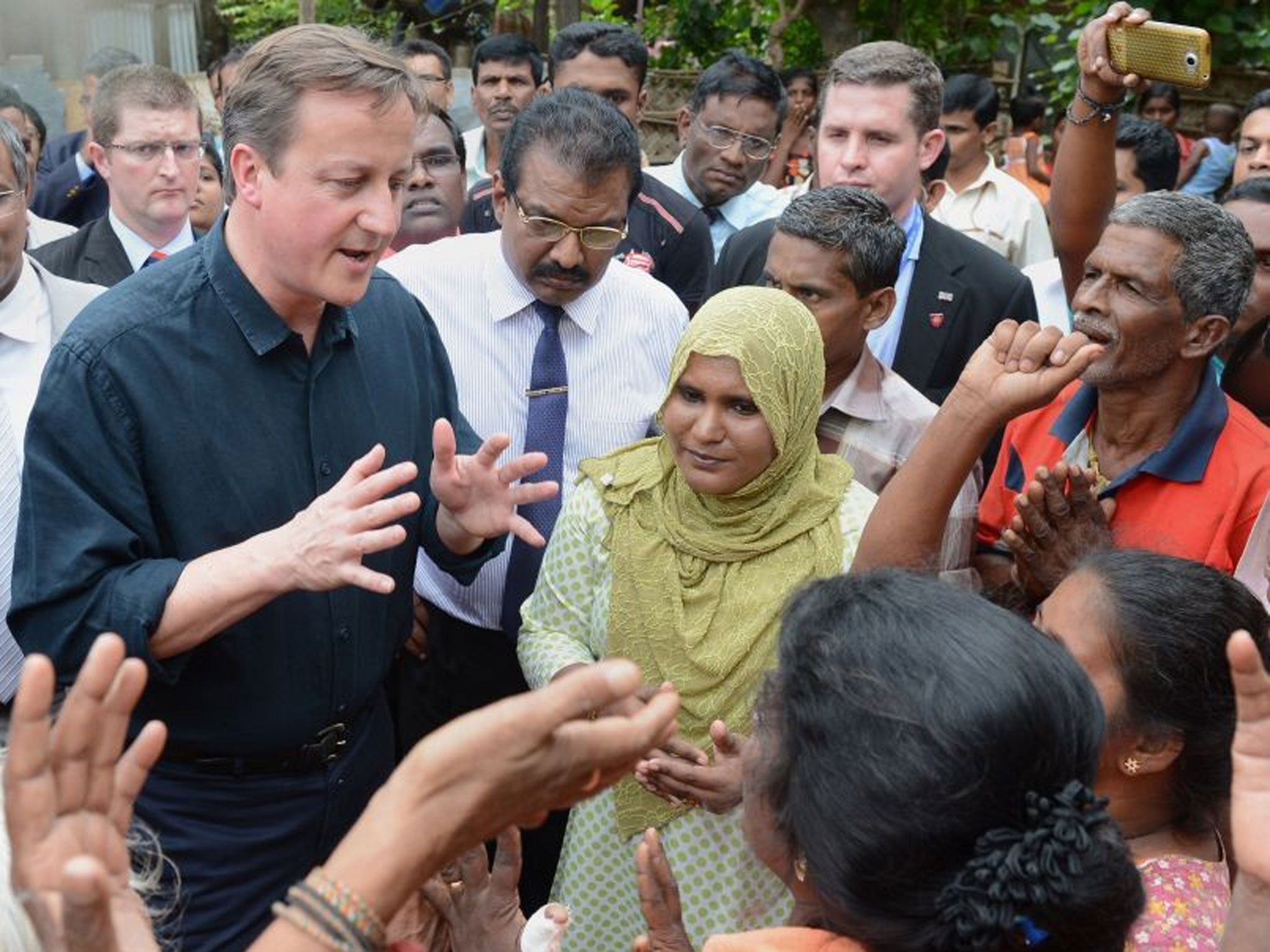Dave goes abroad, but as arms dealer or avenging angel?
Cameron's tough language on Sri Lanka was impressive. But we are still left guessing what the guiding vision is

When David Cameron arrived in Cairo shortly after the resignation of President Mubarak in 2011, he made a point of walking across Tahrir Square. It was a perfect photo opportunity for the Prime Minister, who was snapped on the spot where protesters had defied Mubarak's security forces.
Sadly for Mr Cameron, the symbolism was undermined by his companions on the trip, who included representatives of eight arms manufacturers. The Prime Minister's claim that he wanted to help create the "building blocks of democracy" would have sounded more convincing if he hadn't turned up with his pockets full of military equipment, so to speak. He did it again on a Middle East trip last year, leading critics to accuse him of indulging in a "disturbing trade-off" between jobs and human rights.
Two days ago, a very different photo opportunity presented itself. Mr Cameron was in Sri Lanka for the Commonwealth Heads of Government Meeting (Chogm), after ignoring calls to boycott the event because of the Sri Lankan government's dreadful human rights record. As many as 100,000 people may have died in the protracted civil war between government troops, drawn from the island's Sinhalese majority, and the separatist Tamil Tigers.
Both sides were accused of a "flagrant disregard" for the welfare of civilians, and there were horrifying casualties among non-combatants during the war's final months. But it is the Sri Lankan government, led by a former human rights lawyer, which stands accused of the worst atrocities. The allegations include mass rape, torture and targeting Tamil civilians caught up in the fighting.
On Friday morning, Mr Cameron flew north to the Tamil-dominated former war zone of Jaffna, where his convoy was stopped by around 250 protesters. The army tried to hold them back but could not hide the sight of grey-haired women clutching tattered photographs of sons, daughters and husbands which they pressed against car windows. The pictures flashed round the world, drawing attention to "the disappeared". Many people vanished during the war but reports from Sri Lanka in the last few days talk about opponents of the government being carted off to unknown destinations in white vans.
The country is particularly dangerous for journalists, as the Prime Minister discovered when he visited the Uthayan newspaper's office in Jaffna; staff say six colleagues have been killed by paramilitary gangs sent by the government, while the editor lives in the office after surviving assassination attempts. "This is going to make a very lasting impression on me", Cameron said.
On Friday evening, back in Colombo, the PM duly met Sri Lanka's President Mahinda Rajapaksa – and that's when things began to go wrong. Tamils in the north were still reeling from Mr Cameron's visit, which one of them described as a "very big gift for us", but the hour-long meeting between the two leaders achieved little. Mr Cameron challenged the President over alleged human rights abuses but it's pretty clear he got a dusty answer. There is no appetite in the Sri Lankan government to investigate historic or ongoing allegations, and the risk for Cameron is that he has raised expectations which will be hard to fulfil. After the meeting, he said he had given Mr Rajapaksa a deadline of March to conduct an independent investigation or face an inquiry under the auspices of the UN Human Rights Council – a threat so empty that it is akin to being slapped with a wet fish. The council's members include significant human rights abusers, such as China, Russia, Saudi Arabia and Vietnam, who are unlikely to support an inquiry which would draw attention to their own records.
There is an alternative. The International Criminal Court was set up to deal with exactly this situation and there have been calls for Mr Rajapaksa to be indicted on suspicion of war crimes; he would not be the first serving president in that situation, a distinction owned by Omar al-Bashir of Sudan. The big question is whether Cameron has the stomach for it, and the signs are not good. Indeed, this latest episode draws attention to inconsistencies in his foreign policy, which seems to veer between hard-hearted pursuit of Britain's commercial interests and attacks of conscience.
He has no scruples about selling arms to Saudi Arabia or to the Middle East more generally. He's happy to lead trade missions to China, which has only just announced its intention to abolish a system of terrible labour camps. On the other hand, he signed up to getting rid of Colonel Gaddafi in 2011 and he recalled Parliament this summer in an unsuccessful attempt to persuade MPs to consider military action in Syria.
In other words, it isn't easy to work out where Mr Cameron's ethical boundaries lie. Before he went to Chogm, the Prime Minister talked about Channel 4's harrowing investigation into the final months of the Sri Lankan war, and said he found the images "completely chilling". Could it be that he was moved to challenge the regime by something as random as a TV documentary? It was a memorable piece of journalism, but foreign policy needs to be based on clear and consistent principles.
It's time for the real David Cameron to stand up. Is he a pragmatic salesman for UK PLC or a committed human rights defender? President Rajapaksa appeared unworried after their meeting, and I suspect he's banking on the former.
Join our commenting forum
Join thought-provoking conversations, follow other Independent readers and see their replies
Comments
Bookmark popover
Removed from bookmarks